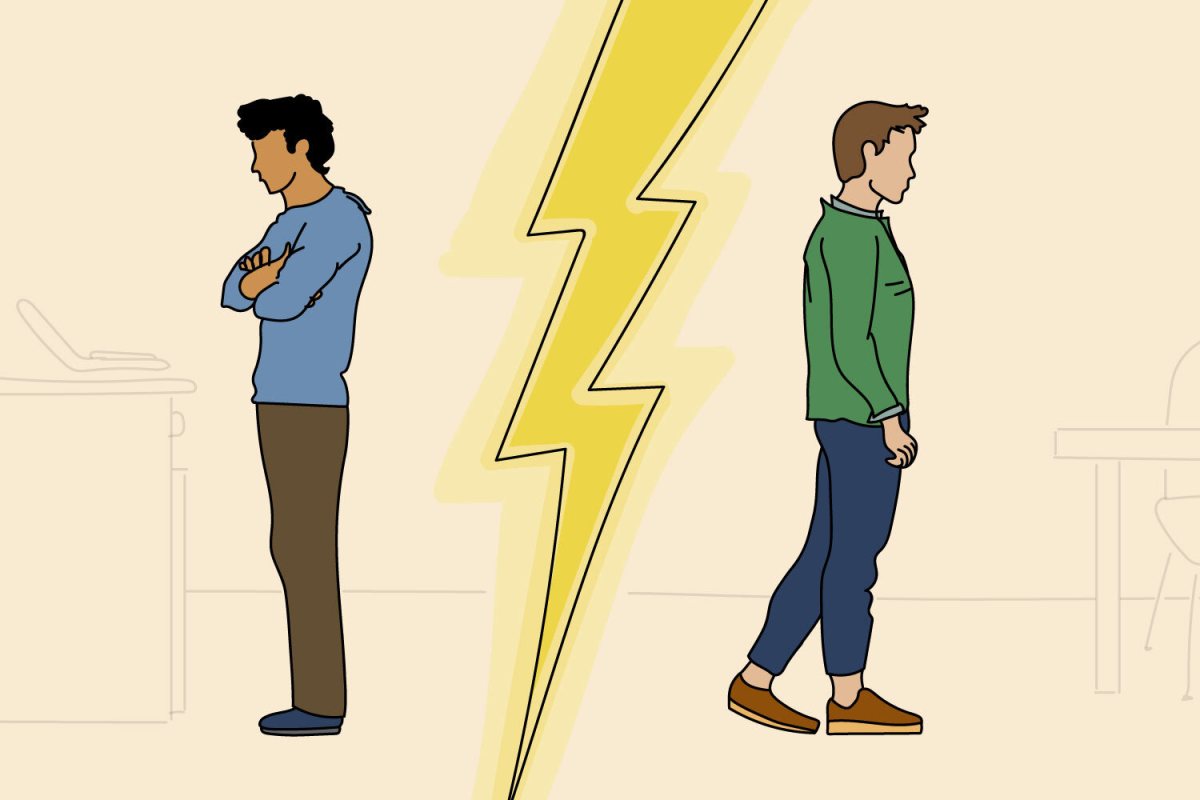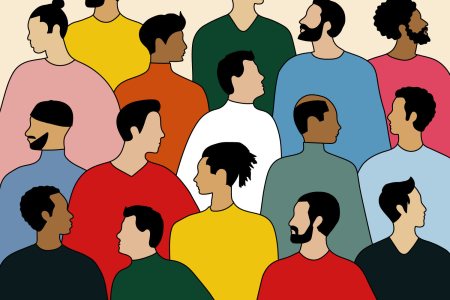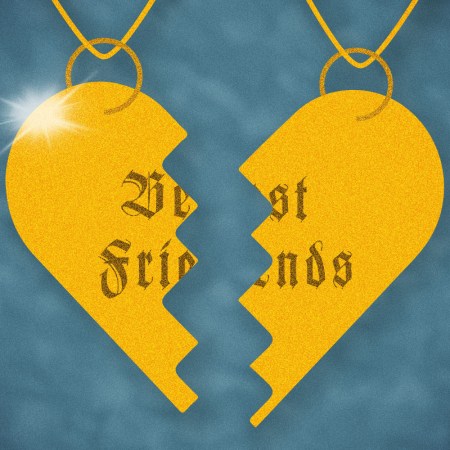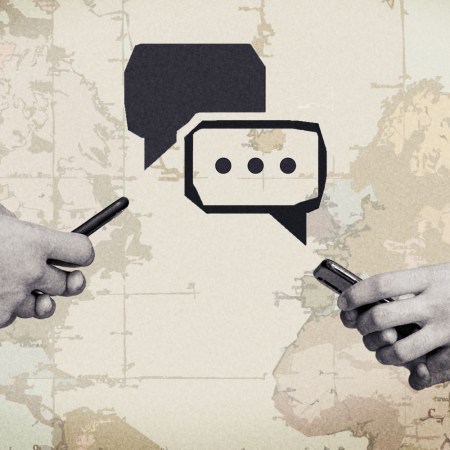During the month of April, we’re publishing a series of interviews, essays, advice columns and reported features about the male friendship crisis in the U.S., a particularly troubling slice of the country’s larger loneliness epidemic. There’s no one-size-fits-all solution, so we’re breaking it down from all angles in The Male Friendship Equation.
“I’m still really pissed off about it,” says Joe Simpson of the man he used to call his best friend. “I don’t think he gets how one-sided our friendship had become.” The problem? They had, he says, never spoken much on the phone, but regularly enjoyed time out together. That is, until Simpson moved about an hour’s train ride from the city. “And the expectation then quickly became that I would go back to the city to see him, never the other way round. He didn’t seem to get that it’s the same distance in both directions.” There’s the occasional text, but they haven’t seen each other in two years.
That’s men for you, suggests Daniel Ellenberg. “It’s changing, slowly, but they’ve been conditioned to focus on the outer world and tend to treat the inner, emotional world with suspicion,” says Ellenberg, president of Relationships That Work, which offers personal and professional development services. Men hunt and fight, as it were, while women tend to heart and hearth. “Revealing hurt is still seen by them as un-masculine, which puts them at a disadvantage when it comes to managing [troubled friendships]. The intimacy — and [intimacy] between men is still considered taboo by some — required to correct a problem gets left out. Instead, they ignore issues with their friends, pretend they haven’t happened, decide to ‘put it behind them,’ none of which leads to a deeper friendship.”
This mindset doesn’t lead to more friendships, either. According to a Survey Center on American Life report, men have fewer social ties with other men than they used to: In 2021, only 27% of men said they had at least six close friends, compared to 55% in 1990. This is probably down to having fewer civic ties and to changes in the workplace, despite many studies suggesting the importance of male friendships in buttressing against poor mental health, and that they are in some ways more fulfilling than romantic relationships.
This means there is a big task ahead of society, says Ellenberg: to challenge the artificial ways in which men and their emotional capacity is understood. But long-term, sweeping societal changes won’t help men whose friendships need repairing now.
One thing I see in counseling sessions is that men are much more ready than women to let a close male relationship go. Men just don’t know how to respond [to a relationship crisis].
Adrian Wilson-Smith, psychotherapist
The first step to recovering a friendship is also the biggest one: someone, he says, has to offer the olive branch. That’s hard when, he concedes, “men do tend to value close relationships less than women, and what we value less we pay less attention to.” In other words, male friendships can tumble into a downward spiral. The longer men delay reaching out, the harder it may become. So proffer the olive branch right now, as alien as that may feel to you.
“There’s the sense that men are hardwired to think of their relationships as needing to have a purpose: they want to know what a relationship is for,” explains Adrian Wilson-Smith, a psychotherapist. “As a result, one thing I see in counseling sessions is that men are much more ready than women to let a close male relationship go [if it seems to have declined or failed], and in a way that most women would find devastating. Men just don’t know how to respond [to a relationship crisis]. Really, it’s relationship skills and less sex education that needs to be taught to them in schools.”
This idea of male friendships needing a purpose is seen, for example, in how they often tend to function around regularly scheduled events: that monthly trip to a bar, perhaps, or to see the game. That’s one reason Simpson’s friendship may have struggled. “Very rarely do I see men reach out to friends they haven’t seen for a long time. They need that schedule,” suggests Fredric Rabinowitz, professor of psychology at the University of Redlands. “A lot of male interaction is around a third thing — something outside of themselves. It requires a risk not to become dependent on those third things, and to share something serious. That’s especially the case since men tend to lack practice in sharing personal matters because we’re told [by the culture] to keep them to ourselves.”
Male Friendship Month
The Male Friendship Equation: Meeting a Loneliness Crisis Head-On
Americans are increasingly isolated, especially men. This month, instead of despairing, we’re exploring the state of male friendship, warts and all.However, Rabinowitz argues that sometimes it’s those deeply-embedded tropes of masculinity, which can stop two men confronting a failing friendship, which can also help to fix it: taking a leadership role to make it happen, for example; or that in bluntly stating your trust in your friend to them — trust that he can take what you’re about to say fairly, trust that he respects that you’re exposing yourself in being candid — you’re making your friendship a matter of honor.
“And in male culture that trust bond is sacred,” says Rabinowitz. It is, he says, a way of openly underscoring the importance of that relationship. Joining a men’s group, he suggests, is a fast way to appreciate just how rewarding it can be for men to find that trust, and do so without penalty, even in relative strangers. It’s a lesson you can take forward into maintaining your male friendships.
But go easy with friendships that need to get back on track. Start with a text or two, “a low-risk interaction that’s a way in,” he suggests, though the frequency of even such slight interactions can help build momentum. When you meet up, use that third thing you might both enjoy doing to your advantage. It’s not attending a relationship workshop. Take a long drive to get there: open conversation is far less awkward side-by-side than face-to-face.
Ellenberg further cautions that repair may take time, maybe multiple discussions, especially over conflicts for which the details can neither be proven nor disproven. Not for nothing is it often the case that the deepest male friendships are those that have put in the most time. It’s why older friends are sometimes better able to cope with the barrier of geographic distance: they have a lot of credit in the bank already. Sure, we’re busy, we’re tired, we have families to tend to, but these are all obstructions to maintaining friendships that, frankly, must be actively disregarded.
It’s important to note that when there is an olive branch offered and there is a meeting again, both men are likely to have differing narratives, each subject to the individual’s own complex psychology — a product of their upbringing, life experience, social setting and so on. So make sure to listen. Don’t get defensive. Own your own (bad) behavior if it’s called out.
“It’s all too easy just to vilify your friend [if you feel you’ve been wronged],” says Ellenberg. “You have to be aware that we’re dealing here with the stories we tell ourselves [which may not be true]. Sharing those is better than not, but it doesn’t always go well. Honesty with yourself helps: Are you really trying to rebuild a connection or just get your pound of flesh? Go with a positive intent.”
Go, too, with the kind of understanding of friendships that perhaps comes only with maturity. Recognize that, as Rabinowitz stresses, different friendships meet different needs. “Maybe the guy you have a great time playing sports with isn’t the guy you talk to as you would a therapist. But that’s okay — different friends will bring out different parts of you,” he says. Keep expectations in check: the fewer friends you have, the higher expectations you will have of them, which won’t always prove satisfying to you, or always be fair on them. We’re all human.
It’s also important to learn that not all friendships are for life. “Of course people change, we all change,” Rabinowitz says, adding that not all friendships are worth saving. When “you get [metaphorically] punched in the face, then give a second or maybe a third chance, but [also] recognize that some friendships just aren’t good for you now,” Ellenberg recommends.
Above all, perhaps, recognize that while friendships are crucial to your well-being, they don’t come for free. The good health of a relationship comes at a price: revealing more about yourself.
The Charge will help you move better, think clearer and stay in the game longer. Subscribe to our wellness newsletter today.

























